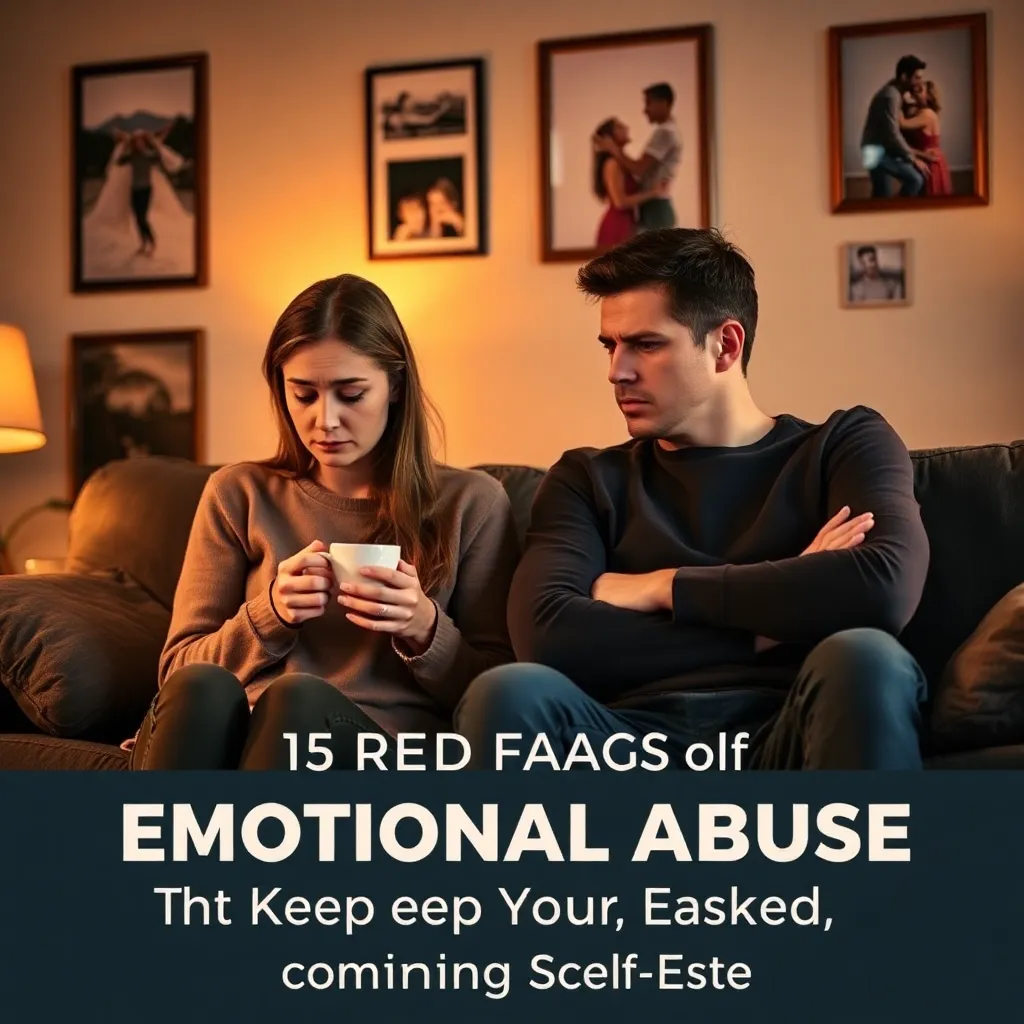Navigating the complex terrain of relationships can be both rewarding and challenging, especially when subtle signs of distress begin to surface. It’s not uncommon to feel confused or even trapped when someone you care about exhibits behaviors that chip away at your emotional well-being. Emotional abuse often creeps in quietly, masked by moments of affection that keep you questioning your own perceptions. Recognizing these signs is crucial for your mental health and reclaiming your sense of self.
In this article, we will delve into the 15 red flags of emotional abuse that can keep you feeling hooked in a damaging relationship. Understanding these signs is the first step toward empowerment and making informed decisions about your future. Each red flag we’ll explore is a critical piece of the puzzle that can help you see the bigger picture of your relationship dynamics. By the end, you’ll have a clearer understanding of what constitutes emotional abuse and how to navigate your path forward.
As we explore these red flags, our aim is to provide you with practical insights and compassionate guidance. These insights are not just theoretical; they reflect the real-life experiences of many who have walked a similar path. Armed with this knowledge, you can begin to assess your relationship and take the necessary steps to protect your emotional health. Remember, recognizing these signs is not just about identifying problems but also about paving the way for healing and growth.
1. Constant Criticism and Blame

Being on the receiving end of constant criticism and blame can slowly erode your self-esteem. In many relationships, partners who criticize excessively often mask their own insecurities by projecting them onto you.
Imagine a scenario where every time you make a decision, it’s met with negativity or blame. Such patterns of behavior can leave you feeling unworthy and unsure of your own choices, creating a cycle that’s hard to break.
Experts in emotional health often point out that persistent blame rarely reflects your true worth. Instead, it often stems from the criticizer’s need to control or feel superior, which can be both confusing and emotionally draining.
To counteract this, it’s vital to create boundaries and seek support from trusted friends or professionals. By recognizing these patterns, you can begin to understand that no one deserves to be consistently diminished by another.
2. Isolation from Loved Ones

Being slowly isolated from your loved ones is a common tactic used in emotionally abusive relationships. This can happen subtly, with your partner expressing jealousy or discomfort about your interactions with family and friends.
Imagine a scenario where you begin to notice that your partner always seems to find a reason why you shouldn’t see your friends. Over time, this can lead to a feeling of loneliness and dependency on your partner for social interaction.
An emotionally abusive partner may begin to plant seeds of doubt about your loved ones, suggesting they are a negative influence or don’t truly care about you. This can cause you to question your own perceptions and distance yourself from those who genuinely care for your well-being.
According to relationship experts, it’s crucial to maintain an independent support network outside of your romantic relationship. Surrounding yourself with trusted friends and family can provide a broader perspective and help you recognize unhealthy patterns.
Recognizing these behaviors as red flags can empower you to take steps to protect your emotional health. Remember, a healthy relationship should enhance your life, not limit your connections with those who love you.
3. Emotional Withholding Tactics

Following isolation, abusers often employ emotional withholding tactics to maintain control. This behavior manifests when they deliberately withhold affection, attention, or approval as a form of punishment, leaving you feeling confused and desperate for their validation.
Imagine being in a relationship where your partner only shows kindness or love when it suits them. In such situations, the unpredictability of their affection can make you feel anxious and insecure, often leading you to doubt your self-worth.
Experts suggest that these tactics are particularly effective because they exploit the target’s need for intimacy and connection. When you’re constantly chasing after the love that is sporadically given and taken away, it can feel like you’re walking on eggshells, afraid to upset the balance.
To counteract these tactics, it’s crucial to recognize this behavior for what it is and set clear boundaries. This involves expressing your needs openly and being prepared to walk away if those needs are consistently ignored or manipulated.
Ultimately, understanding the dynamics of emotional withholding can empower you to seek healthier interactions. Recognizing and addressing these red flags can lead to more fulfilling and balanced relationships in the long run.
4. Gaslighting and Reality Distortion

Gaslighting is one of the most insidious forms of emotional abuse, where the abuser intentionally distorts your sense of reality. You might hear phrases like, “You’re overreacting,” or “That never happened,” which gradually make you doubt your own perceptions and memories.
Imagine finding yourself questioning your recollection of an argument because your partner insists the conversation went differently. Over time, this tactic can erode your self-confidence, leaving you feeling disoriented and dependent on their version of events.
In a scenario where you feel confused about what’s real, it’s crucial to document your experiences. Keeping a journal of events can provide clarity and help you validate your feelings when your reality is questioned.
Experts suggest that consistent exposure to gaslighting can lead to anxiety and depression, making it essential to recognize these patterns early. Identifying and addressing gaslighting can empower you to reclaim your reality and strengthen your emotional resilience.
5. Excessive Jealousy and Control

Experiencing excessive jealousy in a relationship can feel like a constant storm cloud hovering above. It often starts subtly, with your partner questioning your interactions with others, but can quickly escalate to them feeling threatened by your friends and even your family.
As the control intensifies, you might find your autonomy slowly slipping away. You may notice your partner dictating who you can see, where you can go, and even how you should spend your time.
Such behavior often stems from their own insecurities, but it manifests as a toxic need to control your life. In a healthy relationship, partners trust each other and support personal freedom, understanding that love is not about possession.
Experts suggest that addressing these issues early can prevent further emotional damage. Initiating an open and honest conversation about boundaries can help, but both partners must be willing to acknowledge and work on these patterns.
Understanding the difference between reasonable concern and damaging control is crucial for emotional well-being. If you consistently feel stifled or monitored, it’s essential to recognize these signs and take steps to reclaim your independence while fostering a healthier dynamic.
6. Frequent Threats or Ultimatums

In relationships, the use of frequent threats or ultimatums can be a powerful tool of emotional manipulation. For instance, a partner might say, “If you don’t do this, I’ll leave,” creating a constant state of anxiety and insecurity.
The underlying message is often one of control and domination. By making you feel that your actions directly impact the survival of the relationship, the abuser ensures that you remain on edge, constantly trying to please them.
Experts suggest that this tactic is designed to keep you feeling powerless and dependent. When faced with such threats, it’s crucial to recognize that love should not come with conditions or fear-inducing mandates.
Consider the scenario where you are forced to choose between your partner’s demands and your own well-being. It’s important to remember that a healthy relationship is built on mutual respect and understanding, not coercion.
Ultimately, recognizing this pattern is a step toward reclaiming your autonomy and agency. Understanding the dynamics of threats can empower you to make informed decisions about your relationship’s future.
7. Overreaction to Minor Issues

In emotionally abusive relationships, an **overreaction to minor issues** is a common tactic to keep you on edge. You might find yourself constantly **walking on eggshells**, worried about how a simple misstep could lead to an explosive reaction.
Imagine a situation where you accidentally forget to **pick up milk on the way home**. Instead of addressing it calmly, your partner might blow it out of proportion, making you feel **guilty and inadequate** over a trivial mistake.
Such overreactions are designed to make you question and doubt your **own judgment**. This keeps you hooked, as you’re often left trying to **appease** your partner to prevent future outbursts.
Experts note that individuals who overreact to minor issues often have underlying **control issues** or a desire to assert dominance. Recognizing this pattern can empower you to set boundaries and protect your **emotional well-being**.
By taking a step back and observing these patterns, you can better understand the dynamics at play. Remember, healthy relationships thrive on **mutual respect** and understanding, not fear and intimidation.
8. Inconsistent Affection Patterns

In relationships where emotional abuse lurks, you may notice inconsistent affection patterns that leave you feeling confused and insecure. One moment, your partner showers you with love and attention, and the next, they become distant and cold without explanation.
This unpredictable behavior can be emotionally exhausting, as you find yourself constantly trying to decipher what you’ve done to cause the shift. It’s a common tactic used to keep you on edge, making you crave the fleeting moments of affection even more.
Consider the example of a partner who only shows affection after you’ve confronted them about their hurtful behavior. This can create a cycle of dependency where you start to believe that their love is a reward for enduring their mistreatment.
Relationship experts suggest that such patterns can erode your self-esteem and lead to an unhealthy attachment. It’s crucial to recognize these signs and understand that you deserve a relationship where love is consistent and unconditional.
Ultimately, a relationship built on genuine care and respect should not leave you questioning your worth. Understanding this can empower you to seek healthier interactions and set boundaries that protect your emotional well-being.
9. Undermining Self-Esteem

In relationships, undermining self-esteem is a subtle yet powerful form of emotional abuse that can leave you questioning your worth. Picture a partner who constantly makes backhanded compliments or jokes about your abilities; over time, these can erode your confidence and make you reliant on their approval.
Such behavior often comes cloaked in a guise of concern or humor, making it difficult to recognize as harmful. You might hear phrases like “I’m just joking” or “I’m only trying to help,” which can make you doubt your own perceptions and feelings.
To counteract this, it’s crucial to reaffirm your own strengths and remind yourself of your inherent value. Engage in self-affirming activities such as journaling or talking with friends who uplift you, reinforcing the positive aspects of who you are.
Experts suggest that a healthy relationship should be a source of mutual support, not a battlefield for self-doubt. If you find yourself frequently questioning your self-worth due to your partner’s comments, it might be time to seek a neutral perspective from a therapist or counselor.
Ultimately, your self-esteem is a vital component of your well-being, and maintaining it should be a priority in any relationship. Recognizing these red flags and taking steps to address them can empower you to foster a healthier, more supportive partnership.
10. Public Humiliation Instances

Instances of public humiliation can be subtle, yet deeply damaging. An emotionally abusive partner might make a seemingly harmless joke at your expense in front of friends, leaving you feeling small and embarrassed.
Another common tactic is to criticize your appearance or achievements in public settings, under the guise of being helpful. This erodes your self-esteem, making you question your worth and seek validation from the abuser.
Imagine being at a dinner party where your partner makes an offhand comment about your recent mistake at work. Such instances not only humiliate but also reinforce a power dynamic where the abuser holds control over your public image.
To counteract this behavior, start by establishing boundaries around what is acceptable to share publicly. Communicate clearly with your partner about how these instances affect you, and ensure your boundaries are respected.
Recognizing public humiliation as a form of emotional abuse is crucial in taking the first steps towards healing. By understanding these patterns, you can work towards creating a healthier dynamic free from manipulation and control.
11. Blame Shifting and Denial

In the realm of emotional abuse, blame shifting and denial often work hand in hand to distort reality. Picture a scenario where, after a heated argument, the abuser insists that it’s your fault for “overreacting” or “misunderstanding” their intentions.
Such tactics aim to make you doubt your own perceptions and reality, leaving you feeling confused and disoriented. This manipulation can result in you constantly questioning yourself, wondering if perhaps you did misinterpret the situation.
Experts in psychology describe blame shifting as a classic tool used to evade accountability. It allows the abuser to maintain control by ensuring you are the one left feeling guilty and responsible.
To counteract these harmful behaviors, practice self-validation by reaffirming what you know to be true about your experiences. Trust your instincts and remember that your feelings are valid, even if the other person refuses to acknowledge them.
By recognizing these behaviors and seeking support, you can reclaim your sense of self and trust in your own perceptions. Remember, maintaining your mental clarity is essential in navigating through any emotionally abusive relationship.
12. Invasion of Privacy Boundaries

Having your privacy boundaries invaded can feel intensely violating and unsettling. It often starts subtly, with a partner insisting on knowing your phone password or reading your messages under the guise of concern.
Over time, this behavior can escalate into a pattern where your partner demands access to your personal emails or social media accounts. In a healthy relationship, boundaries are respected, and trust is built on mutual understanding, not constant surveillance.
Consider a scenario where your partner insists on knowing your whereabouts at all times or questions every interaction you have. This can lead to an environment where you feel more like a prisoner than a partner, eroding the trust that is essential for a loving relationship.
According to relationship experts, maintaining your privacy is crucial for your emotional well-being and autonomy. If boundary violations persist despite your efforts to communicate, it may be time to evaluate the overall health of the relationship.
13. Dismissal of Your Feelings

In the delicate balance of a relationship, feeling heard and validated is crucial. When your partner consistently dismisses your feelings, it can leave you questioning your own emotions and self-worth. Imagine sharing a tough day at work, only to be met with indifference or a flippant remark. This pattern of behavior can lead to a cycle where you suppress your feelings, fearing they will be trivialized.
One common sign of emotional abuse is the invalidating of emotions, which might be disguised as advice or criticism. For instance, if you express sadness and your partner responds with, “You’re too sensitive,” it minimizes your experience. It’s essential to recognize that this behavior is not just dismissive but also manipulative, as it shifts the focus from your legitimate feelings to an implied personal flaw. Over time, this can erode your confidence in your own emotional reality.
Experts suggest that emotional abusers often use dismissal to maintain control in the relationship. By continuously questioning or ridiculing your feelings, they aim to create a power dynamic where you rely on them for emotional validation. This can result in a dependency that makes it difficult to leave the relationship, as your self-esteem becomes entwined with their approval. Recognizing this pattern is the first step toward reclaiming your emotional autonomy.
In healthy relationships, both partners should feel comfortable expressing their genuine emotions. If you find that your feelings are frequently dismissed, consider seeking support from a therapist or counselor. They can provide strategies to help you communicate more effectively and evaluate the health of your relationship. Ultimately, your emotions deserve to be heard and respected, and by acknowledging this, you’re taking a vital step toward a more balanced relationship.
14. Conditional Love Statements

In emotionally abusive relationships, you might find yourself hearing statements that imply love is *conditional*. These can sound like, “I love you when you’re not so emotional” or “I’d care more if you acted differently.”
Such conditional love statements can leave you feeling *insecure* and constantly striving for approval. They create a dynamic where you’re perpetually trying to meet shifting standards, leaving you emotionally drained.
Imagine a partner who only shows affection when you achieve something they deem important. Over time, this can erode your *self-worth* and make you question your intrinsic value.
Experts warn that love should be *unconditional*, celebrating who you are rather than what you do. If you find yourself in a cycle of earning affection, it’s crucial to reassess the dynamics of your relationship for your emotional well-being.
Understanding the impact of conditional love can empower you to seek healthier relationships. Always remember, *authentic love* does not demand constant validation or change from you.
15. Manipulative Guilt Inducement

In the realm of emotionally abusive relationships, manipulative guilt inducement often acts as a subtle yet powerful hook. Imagine a scenario where a partner consistently makes you feel guilty for not spending enough time with them, despite your best efforts. This tactic can create a cycle of self-blame and anxiety, where you find yourself constantly trying to make amends for perceived shortcomings. It’s essential to recognize this behavior as a manipulation tactic rather than a reflection of your worth.
Experts suggest that emotional abusers use guilt to control their partners, making them feel responsible for the abuser’s happiness. Over time, this can lead to a sense of powerlessness, as you might feel like you’re walking on eggshells to avoid further guilt trips. It’s important to understand that a healthy relationship should be free from such manipulative tactics. Seeking support from a trusted friend or therapist can help you gain perspective and strengthen your emotional resilience.
To counter manipulative guilt inducement, setting clear boundaries is crucial. You might start by calmly expressing your feelings and making it clear that you won’t tolerate guilt-laden narratives. Practicing self-compassion can also help rebuild your confidence and make it easier to stand firm in your convictions. Remember, acknowledging your own needs and limits is key to maintaining your mental and emotional well-being.
Finally, consider how mutual respect and understanding are the foundation of a thriving relationship. A partner who genuinely cares will listen to your concerns and support your growth without resorting to manipulation. By recognizing and addressing these red flags, you empower yourself to nurture healthier connections. Let this awareness guide you toward a future where love is unconditional and free from manipulation.
Conclusion: Creating Beautiful Outdoor Spaces
In navigating the delicate terrain of relationships, recognizing the 15 red flags of emotional abuse—such as manipulation, gaslighting, isolation, and constant criticism—is crucial. These behaviors, along with others like controlling tendencies, emotional withdrawal, and excessive jealousy, can insidiously erode your sense of self and keep you entangled in a toxic cycle. By understanding these signs, you take the first step towards reclaiming your emotional well-being.
Now, take a moment to reflect on your own relationships. Are there behaviors that resonate? If so, consider having an open conversation with a trusted friend or a professional who can provide support and guidance. Empower yourself with knowledge, and remember, awareness is the first step toward positive change.
To ensure that you can revisit these insights whenever needed, be sure to bookmark this article. Having this information readily available can serve as a valuable resource as you work towards healthier, more fulfilling relationships.
As you move forward, remember that awareness and action are the keys to relationship success. With each step you take, you’re building a foundation of respect, understanding, and love. The journey to healthier relationships is ongoing, but every decision you make today shapes a brighter tomorrow.
